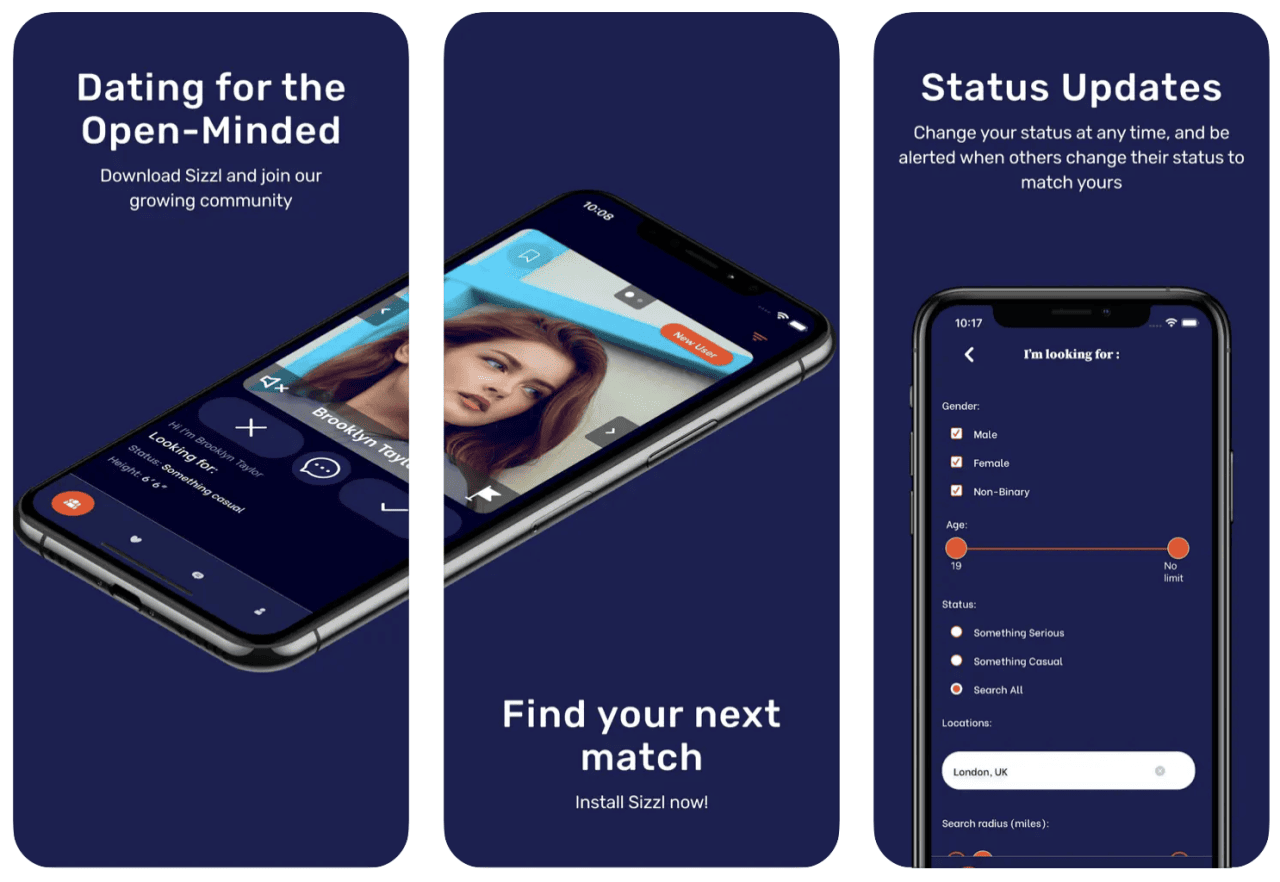Sizzl aims to ignite hook-up market
The latest dating app to attempt to corner the hook-up-seeking market – notoriously tough to own, as so many of these apps get flooded with fake and scammy profiles – is Sizzl, which promises “effortless casual connections”.
You can use Sizzl for £1.99 for a weekend pass, meaning you don’t have to sign up for a subscription to unlock its main functions. You make further micropayments for functions such as messaging other users you haven’t matched with.

As well as a no-subscription model, the app’s focus is on low-pressure casual dating, so there are no notifications from the app and matches don’t time out when left dormant.
Gillian Myhill, co-founder of Sizzl, said: “People have become indifferent to and uninspired by dating apps… you don’t need to subscribe, or answer long-winded questionnaires in real life, so why do it online? We want to make the experience as streamlined and easy as possible.”
Hatched aims to crack “deeper relationships“
“In a world where appearances are glorified, matches are swipeable, and conversations are surface-level, humans yearn to form deeper relationships.” That’s the mantra of Hatched, a dating app that’s rolling out in Charleston in late September 2023, having been launched in Atlanta in 2022.

As anyone who has used Tinder at 2 am on a Sunday morning knows, not every human is yearning for a “deeper relationship”, but Hatched aims to snag a crowd that’s not superficial. You match with other users based on a personality-driven algorithm, then answer questions to give a deeper understanding of your interests and traits. As this process continues your match gradually ‘hatches’ from a shell and reveals their profile photo.
It’s a wholesome idea and one with egg-cellent Easter-related marketing potential.
Hinge is embracing (ethical) AI
We’ve already seen AI creeping into dating apps, largely in the form of users utilizing chatbots to swizz up their profile biographies, but also through reports of suspected scammers seeming to use AI to generate fake profiles.
Now Hinge seems to be tackling the issue head-on, both in terms of tackling rogue AI dating app abusers and utilizing AI as part of Hinge’s interface. The dating app is advertising for a Vice President of artificial intelligence, offering a salary of up to $398,000 a year.

The job is listed by Match Group, Hinge’s owner, and says that the successful applicant will “lay the foundation of AI at Hinge to power user safety, bad actors/algorithms, recommendation engine, AI-generated interactions, etc.” The job will also require the person in the role to develop Hinge’s own AI in an ethical way.
It seems that Match Group is making a wider AI drive with its dating products, with Business Insider reporting that the company is developing tools that would allow AI-enabled photo selection, that would scan your photo album and choose the best images for your app profile.
Match Group’s background hook-up checker ends
Match Group has ended its relationship with non-profit background check organization Garbo, which had provided a limited amount of free background checks on matches on some of Match’s apps including Tinder.
The background checks initially launched on Tinder in 2021 and then rolled out on some other Match Group apps allowed you to see if your match had public reports about violence, past arrests, restraining orders, and convictions.
Garbo founder Kathryn Kosmides said her organization chose to end the relationship with Match Group. She said Garbo had faced a “lack of support and real initiative from online platforms, continuous harassment and threats by bad actors on these platforms,” plus “prolific issues across the justice systems”.
Match Group told The Verge that it was set to announce a new background-check partnership soon.
Cops clock rise of ‘pig-butchering‘

The rise of crypto scams initiated through dating apps has led US law enforcement to come up with a new term for it: pig-butchering.
The act of ‘fattening up’ a scam victim by interacting with them on a dating app, then convincing them to transfer a wad of cryptocurrency to the scammer, is reportedly being used by the FBI and police in the US. Michigan’s attorney general office said that most of these scams originate in southeast Asia, warning that the scammers often “slowly develop a relationship so they can insert themselves into their victim’s daily life.”
While it’s great that US authorities are paying close attention to such scams, we can’t help but feel that using the term ‘pig-butchering’ might put some victims off coming forward about being scammed, considering the existing stigma romance scam victims often face.






Leave a Reply